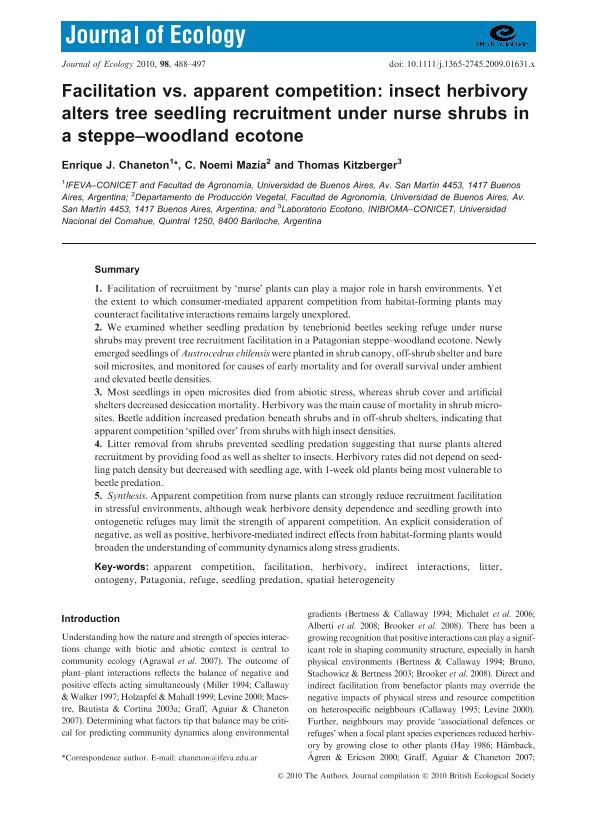Mostrar el registro sencillo del ítem
dc.contributor.author
Chaneton, Enrique Jose

dc.contributor.author
Mazía, Cristina Noemí

dc.contributor.author
Kitzberger, Thomas

dc.date.available
2019-03-18T18:53:14Z
dc.date.issued
2010-03
dc.identifier.citation
Chaneton, Enrique Jose; Mazía, Cristina Noemí; Kitzberger, Thomas; Facilitation vs. apparent competition: Insect herbivory alters tree seedling recruitment under nurse shrubs in a steppe-woodland ecotone; Wiley Blackwell Publishing, Inc; Journal of Ecology; 98; 2; 3-2010; 488-497
dc.identifier.issn
0022-0477
dc.identifier.uri
http://hdl.handle.net/11336/71909
dc.description.abstract
Facilitation of recruitment by 'nurse' plants can play a major role in harsh environments. Yet the extent to which consumer-mediated apparent competition from habitat-forming plants may counteract facilitative interactions remains largely unexplored. We examined whether seedling predation by tenebrionid beetles seeking refuge under nurse shrubs may prevent tree recruitment facilitation in a Patagonian steppe-woodland ecotone. Newly emerged seedlings of Austrocedrus chilensis were planted in shrub canopy, off-shrub shelter and bare soil microsites, and monitored for causes of early mortality and for overall survival under ambient and elevated beetle densities. Most seedlings in open microsites died from abiotic stress, whereas shrub cover and artificial shelters decreased desiccation mortality. Herbivory was the main cause of mortality in shrub microsites. Beetle addition increased predation beneath shrubs and in off-shrub shelters, indicating that apparent competition 'spilled over' from shrubs with high insect densities. Litter removal from shrubs prevented seedling predation suggesting that nurse plants altered recruitment by providing food as well as shelter to insects. Herbivory rates did not depend on seedling patch density but decreased with seedling age, with 1-week old plants being most vulnerable to beetle predation. Synthesis. Apparent competition from nurse plants can strongly reduce recruitment facilitation in stressful environments, although weak herbivore density dependence and seedling growth into ontogenetic refuges may limit the strength of apparent competition. An explicit consideration of negative, as well as positive, herbivore-mediated indirect effects from habitat-forming plants would broaden the understanding of community dynamics along stress gradients. © 2010 The Authors. Journal compilation © 2010 British Ecological Society.
dc.format
application/pdf
dc.language.iso
eng
dc.publisher
Wiley Blackwell Publishing, Inc

dc.rights
info:eu-repo/semantics/openAccess
dc.rights.uri
https://creativecommons.org/licenses/by-nc-sa/2.5/ar/
dc.subject
Apparent Competition
dc.subject
Facilitation
dc.subject
Herbivory
dc.subject
Indirect Interactions
dc.subject
Litter
dc.subject
Ontogeny
dc.subject
Patagonia
dc.subject
Refuge
dc.subject
Seedling Predation
dc.subject
Spatial Heterogeneity
dc.subject.classification
Otras Ciencias Biológicas

dc.subject.classification
Ciencias Biológicas

dc.subject.classification
CIENCIAS NATURALES Y EXACTAS

dc.title
Facilitation vs. apparent competition: Insect herbivory alters tree seedling recruitment under nurse shrubs in a steppe-woodland ecotone
dc.type
info:eu-repo/semantics/article
dc.type
info:ar-repo/semantics/artículo
dc.type
info:eu-repo/semantics/publishedVersion
dc.date.updated
2019-03-08T20:28:24Z
dc.journal.volume
98
dc.journal.number
2
dc.journal.pagination
488-497
dc.journal.pais
Reino Unido

dc.journal.ciudad
Londres
dc.description.fil
Fil: Chaneton, Enrique Jose. Consejo Nacional de Investigaciones Científicas y Técnicas. Oficina de Coordinación Administrativa Parque Centenario. Instituto de Investigaciones Fisiológicas y Ecológicas Vinculadas a la Agricultura. Universidad de Buenos Aires. Facultad de Agronomía; Argentina
dc.description.fil
Fil: Mazía, Cristina Noemí. Consejo Nacional de Investigaciones Científicas y Técnicas; Argentina. Universidad de Buenos Aires. Facultad de Agronomía. Departamento de Producción Animal; Argentina
dc.description.fil
Fil: Kitzberger, Thomas. Consejo Nacional de Investigaciones Científicas y Técnicas. Centro Científico Tecnológico Conicet - Patagonia Norte. Instituto de Investigaciones en Biodiversidad y Medioambiente. Universidad Nacional del Comahue. Centro Regional Universidad Bariloche. Instituto de Investigaciones en Biodiversidad y Medioambiente; Argentina
dc.journal.title
Journal of Ecology

dc.relation.alternativeid
info:eu-repo/semantics/altIdentifier/doi/https://doi.org/10.1111/j.1365-2745.2009.01631.x
dc.relation.alternativeid
info:eu-repo/semantics/altIdentifier/url/https://besjournals.onlinelibrary.wiley.com/doi/full/10.1111/j.1365-2745.2009.01631.x
Archivos asociados
